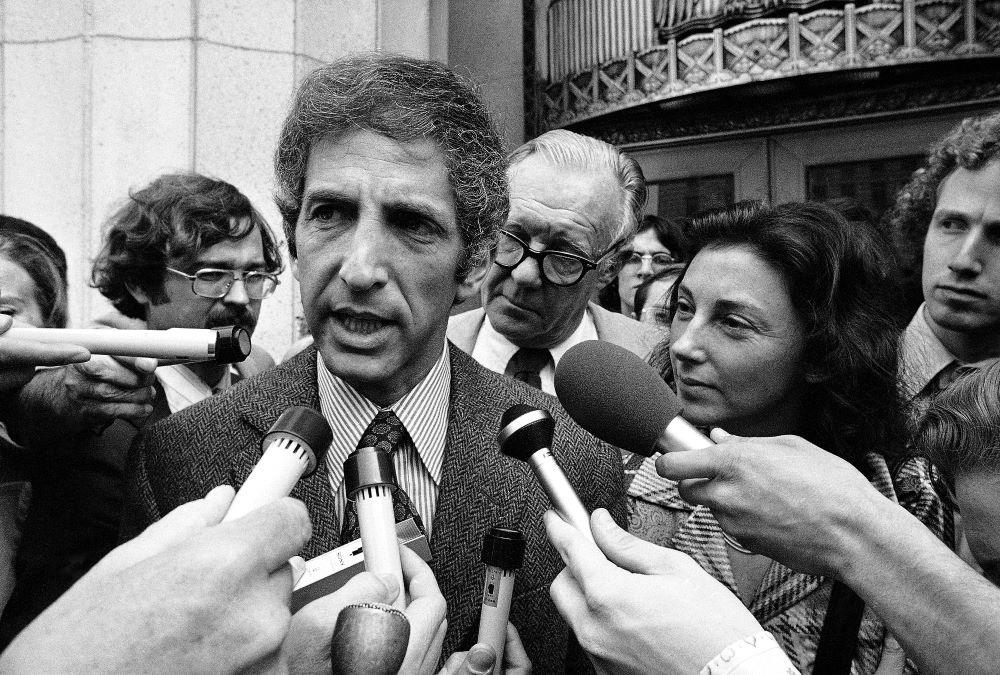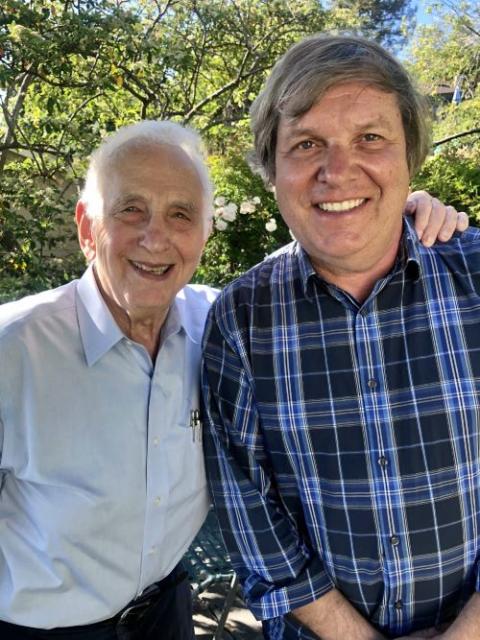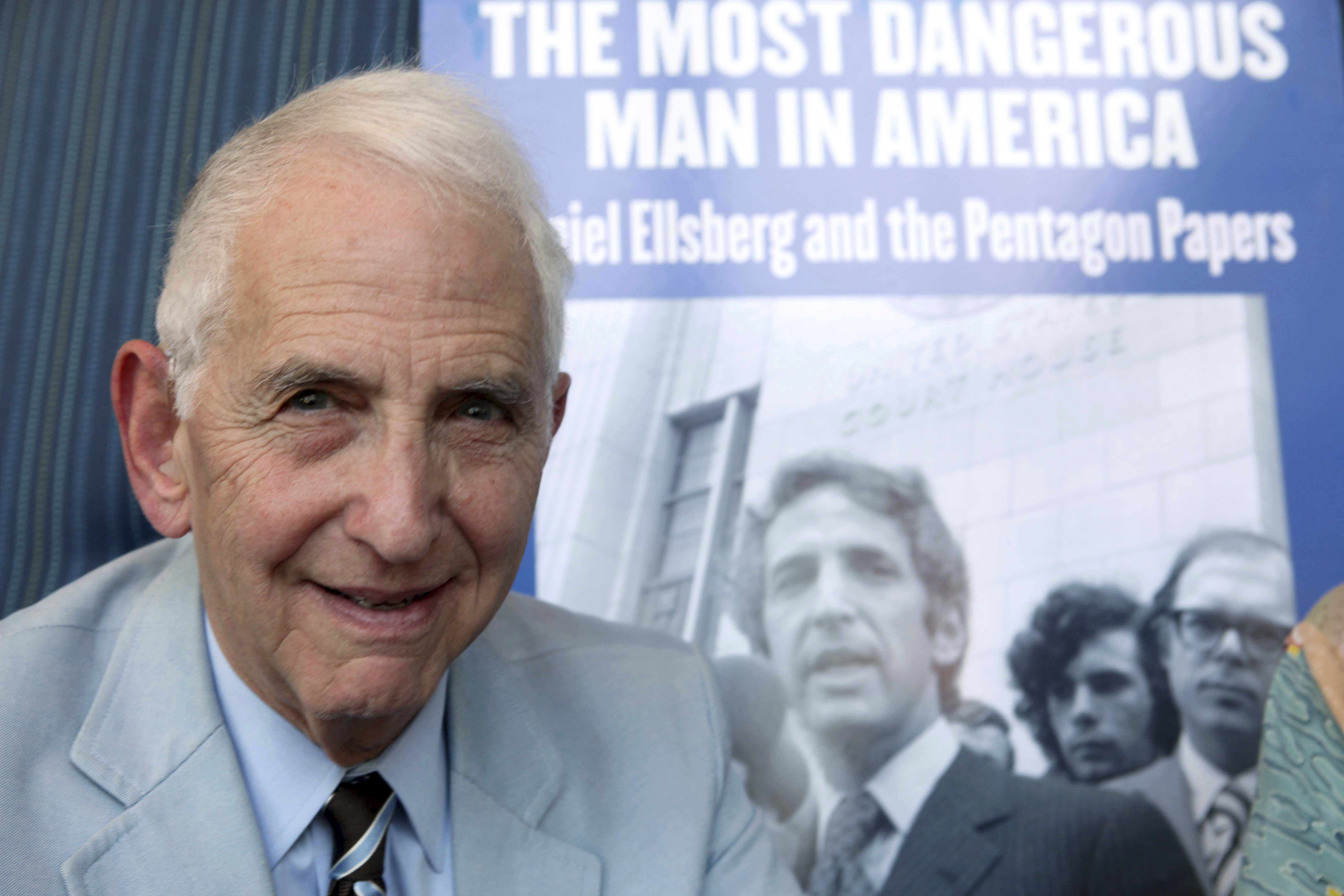
Daniel Ellsberg, co-defendant in the Pentagon Papers case, talks to media outside the Federal Building in Los Angeles, April 28, 1973. Ellsberg, the government analyst and whistleblower who leaked the Pentagon Papers in 1971, then became a passionate antiwar activist, died June 16. He was 92. (AP Photo/Wally Fong, file)
A few months before he died on Friday, June 16, famed whistleblower and peace activist Daniel Ellsberg emailed a letter to hundreds of friends announcing that he had been diagnosed with pancreatic cancer and given three months or so to live. After reflecting on his life's work for peace, he announced that he was full of "joy and gratitude" and wished the same for all of us who work to end war.
It was one of the most moving and hopeful letters I've ever received. For weeks now, I've been hearing regularly from his son, my friend Robert Ellsberg, about the profound peace, joy and sheer happiness Dan was experiencing as he faced his last days. It was fitting that this great icon of peace and truth should know such profound consolation in his last months.
"When I copied the Pentagon Papers in 1969," Dan wrote on March 1,
I had every reason to think I would be spending the rest of my life behind bars. It was a fate I would gladly have accepted if it meant hastening the end of the Vietnam War. Yet in the end, that action—in ways I could not have foreseen, due to Nixon's illegal responses—did have an impact on shortening the war. In addition, thanks to Nixon's crimes, I was spared the imprisonment I expected, and I was able to spend the last fifty years with Patricia and my family, and with you, my friends.
"What's more," he continued, "I was able to devote those years to doing everything I could think of to alert the world to the perils of nuclear war and wrongful interventions: lobbying, lecturing, writing and joining with others in acts of protest and nonviolent resistance."
My dear father, #DanielEllsberg, died this morning June 16 at 1:24 a.m., four months after his diagnosis with pancreatic cancer. His family surrounded him as he took his last breath. He had no pain and died peacefully at home. https://t.co/x5qm73LW3c pic.twitter.com/GTBqgAADYj
— @RobertEllsberg (@RobertEllsberg) June 16, 2023
Dan's death at age 92 has made headlines around the world, not only because of the Pentagon Papers and the lies he exposed about the horrific Vietnam War, but because his daring act led to the Supreme Court's 1971 decision to uphold freedom of the press, and then further revelations of Nixon's other crimes and, ultimately, his resignation.
But for many of us who labor for peace and disarmament, it's the 50 years of peace activism that followed the release of the Pentagon Papers that has been so inspiring. I knew Dan personally for more than 35 years, and I can attest that he never once let up his passionate writing, speaking and demonstrating for an end to war and nuclear weapons. He was one of the most passionate antiwar truth-tellers not just in U.S. history, but in all of history.
A week before Martin Luther King Jr. was killed, he announced his definition of hope as "the final refusal to give up." In that spirit, Dan Ellsberg was one of the most hopeful, persistent peacemakers in the world.
Dan would be the first to acknowledge the influence of the growing antiwar movement for his decision to release the 7,000 pages outlining the history of U.S. warmaking in Vietnam. It was Randy Kehler's speech at the 1969 War Resisters League conference that turned Dan around.
Randy announced to the small crowd that he was about to head off to prison for refusing to be drafted. After hearing his speech, Dan went to the nearest men's room, sat down on the floor and sobbed uncontrollably for an hour. If this young man could go to prison to stop this war, he asked himself, what am I going to do?
He knew that he faced life imprisonment, and might even be killed for releasing the papers, but the steadfast resistance of young people like Kehler inspired him to risk his own career and life.
'As I look back on the last sixty years of my life, I think there is no greater cause to which I could have dedicated my efforts.'
—Daniel Ellsberg
There's an important lesson here: We may never know the outcome of our public work for peace and how it might touch others in unexpected ways, but we can trust the God of peace, resist war, speak the truth, and do what's right simply because it's right and true. We can know that, despite the odds, the God of peace can use us to build a tidal wave of opposition that can stop a war and change the world.
I saw Dan many times over the decades and was arrested with him at various antinuclear protests. Last year, while visiting him and his family for a day in Berkeley, I reminded him of a moment that has stayed with me.
It was 1995 and Dan and I were holding a press conference to network news reporters on the steps of the National Air and Space Museum in Washington, D.C. That afternoon, we had met with the head of the Smithsonian Museum and officials from the Air and Space Museum. We asked them to change the script that was about to be unveiled at the new display of the Enola Gay, the bomber that had dropped the atomic bomb on Hiroshima 50 years earlier.

The author, Fr. John Dear, is pictured with Daniel Ellsberg last year while visiting Ellsberg's house in Berkeley. Dear called his longtime friend and antiwar activist "an icon of peace and truth." (Courtesy of Robert Ellsberg)
We argued passionately that, contrary to the Smithsonian's conclusion that the U.S. atomic bombings "saved lives," instead, it killed some 200,000 people and was done to prove our military superiority over the Russians. It led directly to the development of the nuclear arms race that continues to threaten the planet today. Eventually, we persuaded the Smithsonian to drop its entire display, which they had spent 10 years and millions of dollars preparing.
After our press conference, I turned to Dan and thanked him for his help to stop the revisionist lie about Hiroshima. He looked me in the eye and said, "No, John, there's nothing to thank me for yet. You and I have to keep working for the complete abolition of nuclear weapons. That's what I want and what I intend to do till the day I die if necessary."
I was profoundly moved and inspired by his determination, and witnessed him speak out for the urgent need to abolish nuclear weapons right til the end. His health took a turn last week just as he was preparing to be interviewed for the CBS television show "60 Minutes."
"I wish I could report greater success for our efforts," Dan wrote on March 1.
As I write, 'modernization' of nuclear weapons is ongoing in all nine states that possess them (the US most of all). Russia is making monstrous threats to initiate nuclear war to maintain its control over Crimea and the Donbas--like the dozens of equally illegitimate first-use threats that the US government has made in the past to maintain its military presence in South Korea, Taiwan, South Vietnam, and (with the complicity of every member state then in NATO) West Berlin. The current risk of nuclear war, over Ukraine, is as great as the world has ever seen.
China and India are alone in declaring no-first-use policies. Leadership in the US, Russia, other nuclear weapons states, NATO and other US allies have yet to recognize that such threats of initiating nuclear war--let alone the plans, deployments and exercises meant to make them credible and more ready to be carried out--are and always have been immoral and insane: under any circumstances, for any reasons, by anyone or anywhere.
He concluded: "As I look back on the last sixty years of my life, I think there is no greater cause to which I could have dedicated my efforts."
We may never know the outcome of our public work for peace and how it might touch others, but we can trust the God of peace, resist war, speak the truth, and do what's right simply because it's right and true
What a profound statement! Many national leaders have said that Daniel Ellsberg was one of the smartest persons on the planet, and so it is noteworthy that this brilliant man insists that the best way we can spend our lives is to work for the abolition of nuclear weapons.
But Dan didn't stop there. Instead of lamenting his personal predicament, he went on at length in his last letter to lament our global predicament — one that we never hear anyone talk about: the impending catastrophic threat of a nuclear winter.
For the last forty years we have known that nuclear war between the US and Russia would mean nuclear winter: more than a hundred million tons of smoke and soot from firestorms in cities set ablaze by either side, striking either first or second, would be lofted into the stratosphere where it would not rain out and would envelope the globe within days. That pall would block up to 70% of sunlight for years, destroying all harvests worldwide and causing death by starvation for most of the humans and other vertebrates on earth. So far as I can find out, this scientific near-consensus has had virtually no effect on the Pentagon's nuclear war plans or US/NATO (or Russian) nuclear threats.

Daniel Ellsberg, the government analyst and whistleblower who leaked the Pentagon Papers in 1971, speaks during an interview in Los Angeles on Sept. 23, 2009. Ellsberg died June 16 at age 92. (AP/Nick Ut, file)
Dan's two mammoth best-selling memoirs, Secrets: A Memoir of Vietnam and the Pentagon Papers and The Doomsday Machine: Confessions of a Nuclear War Planner, should be required reading for every American. Yes, he is the father of all whistleblowers, and his support of Julian Assange, Chelsea Manning and Edward Snowden should push us all to do likewise. Yes, his public efforts to help end the U.S. wars in Iraq and Afghanistan were critically helpful in breaking through the silence, as were his regular talks and periodic civil disobedience in our campaign to close Livermore Laboratories near the Bay Area.
But I think Dan was far greater than he has been portrayed in the mainstream media. To me, Dan was a holy prophet. He was like Isaiah, calling us to "beat swords into plowshares and study war no more." He was like Ezekiel, describing the nightmarish vision of a field of dry bones. He was like Jonah walking across the great city of Nineveh, crisscrossing the U.S., calling Americans to repent of the mortal sin of war and nuclear preparations, and to give our lives like him in a new global grassroots peace movement for the abolition of war itself and a new culture of peace and nonviolence.
Unlike the people of Nineveh, we Americans have not heeded his call; nevertheless, it is not yet too late to repent.
In this historical moment when we have so little leadership, so little vision, so little courage, Dan Ellsberg was the real thing. He offered the prophetic vision, voice and leadership that we desperately needed. He pointed a way back from the brink of permanent warfare and nuclear destruction toward the sanity of peace and nonviolence. Despite what he said of himself, his was a devoutly religious life for he gave himself every day to the cause of truth, peace and the fullness of life for all.
Advertisement
His visionary leadership and prophetic voice for peace should be the norm for every U.S. priest and bishop, and yet it is almost entirely absent — except of course for Bishop Tom Gumbleton, Bishop John Stowe and Archbishop John Wester, who last year published his great pastoral letter, “Living in the Light of Christ’s Peace: A Conversation Toward Nuclear Disarmament.”
As I mourn my friend and celebrate his peacemaking life, my thoughts turn to those unheralded brave souls who continue his effort to uphold the vision of nuclear disarmament. Today, the International Campaign to Abolish Nuclear Weapons has helped 68 nations to sign as parties to the U.N. Treaty on the Prohibition of Nuclear Weapons.
Last week, I joined a Zoom session with Rep. Jim McGovern of Massachusetts, who has launched the first serious bill in Congress (H Res 77) to get the United States on track to dismantle its nuclear arsenal and sign the UN ban treaty. I urge everyone to join this campaign, led by Back from the Brink, and to publicize this great effort.
Dan now lives on with the God of peace and all the great prophets of peace. May the rest of us heed his cry, repent of our nuclear violence like the people of Nineveh and welcome God’s gift of peace. Thank you, Daniel Ellsberg, as poet Gerard Manley Hopkins would say, for "brute beauty and valor and act." Pray for us who remain that we too might persist, come what may and do our part to abolish war and nuclear weapons forever. Amen.







